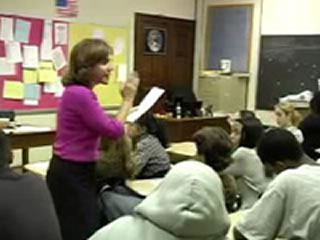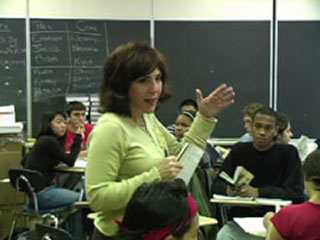Whose English? Getting Students into the Language of Shakespeare
|
|
 |
| This inquiry gave my
students a sense of context and history for the language
that they encounter in Macbeth. |
play
|
Quicktime
Player
high • low
get
plugin |
Windows
Media
high • low
get
plugin |
I engage my students in a course inquiry theme on the History
of the English Language. In this theme, we focus on questions about
language and power, how language changes, about whose language
is considered standard, whose is substandard and why. We
look at varieties of written and spoken English and trace the history
of it. We
don't just take it for granted; I don't just teach them the rules
of grammar and usage so that they can identify something that’s
incorrect on the SAT of standard written English. I prepare
them so they’re able to
identify errors in usage and grammar on the SATs, but I also engage
them in deeper conversations about language and history and culture
and power, and their own lives.
It is important to start with the language inquiry, because this
inquiry leads to the Shakespeare. This gives students a sense
of context and history for the language that they encounter
in the play. While they are familiar with it, having read at
least one Shakespeare play a year since fifth grade, they have
never analyzed the structure of the language.
I try to show them what they already know about English and language
by having them describe the features of the Lord’s Prayer
in Old English, then in Middle English and then to compare the
differences. Finally, when we see how different the two languages
are, I ask them to consider what may have happened to cause such
drastic changes in the language. When they understand that the
changes were caused by the Norman Invasion and French rule of England,
they see that English is a creole language that combines features
of Old English and French or even German and Latin. They
also understand why there are so many contradictions and exceptions
to rules in this language. There are also implications for social
class as well with the upper classes speaking French and the lower
classes speaking English. These distinctions exist in the language
today with pairs of words such as house and mansion or room and
salon.
More:

